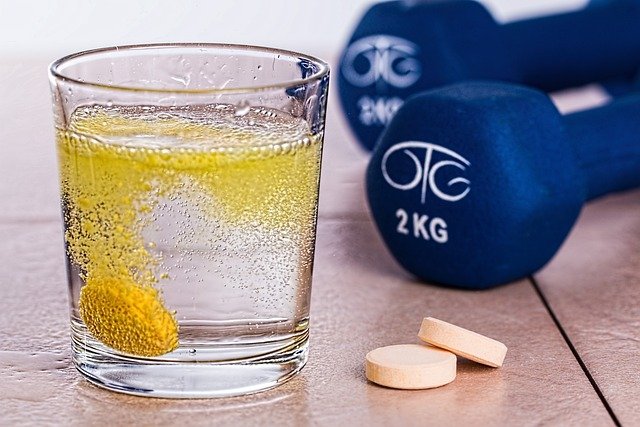How Drinking Water Can Boost Your Immune System
There are some affiliate links below, but they are all products I highly recommend. For more info, view my disclosure here.
Are you looking for a simple and effective way to boost your immune system? Look no further than your own kitchen tap!
Drinking water not only keeps you hydrated, but it also plays a vital role in strengthening your immune system. By supporting the function of white blood cells, aiding in the production of antibodies, and flushing out toxins and pathogens, staying hydrated can help you stay healthy and ward off infections.
So grab a glass of water and let’s dive into the benefits of hydration!
The Importance of Hydration for Your Immune System
Staying hydrated is crucial for supporting your immune system. When you’re properly hydrated, your body functions at its best, and this includes your immune system. Water helps to carry oxygen to your cells, which is essential for the proper functioning of your immune system. It also helps to flush out toxins and waste products from your body, preventing the buildup of harmful substances that can weaken your immune system.
Dehydration, on the other hand, can have a negative impact on your immune system. When you’re dehydrated, your body doesn’t have enough fluids to carry out its normal functions, including fighting off harmful pathogens. This can make you more susceptible to illnesses and infections.
In addition to supporting your immune system, staying hydrated can also help to alleviate symptoms if you do get sick. Drinking plenty of fluids can help to thin mucus and make it easier to expel, relieving congestion and coughing. It can also help to keep your throat moist, reducing discomfort and irritation caused by a sore throat.

How Water Supports the Function of White Blood Cells
You can enhance the function of your white blood cells by properly hydrating. Drinking enough water is crucial for maintaining a strong immune system. White blood cells are responsible for fighting off infections and keeping your body healthy. When you’re dehydrated, the production of white blood cells can be affected, making it harder for your body to defend against harmful bacteria and viruses.
Water plays a vital role in the functioning of white blood cells. It helps to transport nutrients and oxygen to these cells, allowing them to perform their immune defense duties effectively. Water aids in the removal of waste products from the body, ensuring that white blood cells can work efficiently without any hindrances.
Proper hydration also helps to prevent the thickening of blood, which can impede the movement of white blood cells. When your blood is too thick, it becomes harder for white blood cells to reach the site of infection or injury. Drinking enough water keeps your blood thin and flowing smoothly, enabling white blood cells to travel easily throughout your body and fight off any invaders.
Hydration and the Production of Antibodies
Maintaining proper hydration ensures that antibodies are produced effectively, supporting your body’s defense against infections and diseases. When you’re adequately hydrated, your body can efficiently produce antibodies, which play a crucial role in fighting off harmful pathogens. Antibodies are proteins that recognize and neutralize foreign substances, such as bacteria and viruses, preventing them from causing harm to your body.
Water is essential for the production and function of antibodies. It helps to transport nutrients and oxygen to your immune cells, allowing them to work efficiently. When you’re dehydrated, your body may struggle to produce enough antibodies, weakening your immune system’s ability to fight off infections.
Drinking enough water throughout the day is especially important during times when you’re at a higher risk of infections, such as during cold and flu seasons. By staying hydrated, you give your body the necessary tools to produce antibodies effectively and mount a strong defense against pathogens.
In addition to drinking water, you can also increase your hydration levels by consuming water-rich foods, such as fruits and vegetables. These foods not only provide water but also contain important vitamins and minerals that support immune function.
Water’s Role in Flushing Out Toxins and Pathogens
Proper hydration helps to flush out toxins and pathogens from your body, supporting the overall health and function of your immune system. When you drink enough water, it helps to keep your blood volume at an optimal level, allowing your immune cells to travel efficiently throughout your body. This ensures that they can effectively locate and eliminate any harmful substances or invading pathogens that may be present.
Water plays a crucial role in the detoxification process. It helps to remove waste products from your cells, tissues, and organs, allowing your body to function properly. When you’re properly hydrated, water helps to support the functioning of your kidneys, which are responsible for filtering waste and toxins from your bloodstream. This process ensures that harmful substances are excreted through urine, reducing the burden on your immune system.
Furthermore, drinking enough water promotes healthy bowel movements, preventing the buildup of toxins in your digestive system. It helps to soften your stool, making it easier to pass and eliminating any waste products that may harbor harmful bacteria or toxins.

The Connection Between Dehydration and Weakened Immune Response
When you’re dehydrated, it can weaken your immune response and make you more susceptible to illness and infection. Your body’s immune system relies on water to function properly. Without enough hydration, your immune cells may not be able to work efficiently and effectively. Dehydration can impair the production of antibodies, which are essential for fighting off harmful bacteria and viruses. It can also affect the production of white blood cells, which play a crucial role in defending your body against foreign invaders.
Furthermore, dehydration can hinder the movement of immune cells throughout your body. These cells need to be able to travel freely to different parts of your body to identify and eliminate pathogens. When you’re dehydrated, this movement becomes limited, reducing your immune system’s ability to respond quickly and effectively to infections.
Water plays a vital role in maintaining the mucous membranes in your respiratory and digestive tracts. These membranes act as a physical barrier, preventing pathogens from entering your body. When you’re dehydrated, these membranes can become dry and less effective, making it easier for bacteria and viruses to invade your system.
To support your immune system and stay healthy, it’s crucial to stay adequately hydrated. Make sure to drink water throughout the day, especially when you’re feeling thirsty or when engaging in activities that cause you to sweat.
Hydration and the Prevention of Respiratory Infections
Staying adequately hydrated can help prevent respiratory infections. When you drink enough water, you’re keeping your body hydrated and supporting your immune system. By staying hydrated, you’re helping your body produce enough mucus, which is important for trapping and eliminating bacteria and viruses that can cause respiratory infections.
When you’re dehydrated, the mucus becomes thick and sticky, making it difficult for your body to clear out harmful pathogens. Drinking water helps to flush out toxins from your body, keeping your respiratory system healthy and reducing the risk of infections. Water also helps to maintain the moisture in your throat and nasal passages, which acts as a protective barrier against respiratory viruses.
It’s recommended to drink at least eight glasses of water a day to stay adequately hydrated. Remember to listen to your body’s signals and drink water whenever you feel thirsty. By prioritizing your hydration, you can boost your immune system and reduce the chances of developing respiratory infections.
Tips for Staying Hydrated and Boosting Your Immune System
To keep your body properly hydrated and support a healthy immune system, make sure you’re drinking enough fluids throughout the day.
Water is essential for maintaining your overall health and well-being. It helps to flush out toxins, regulate body temperature, and transport nutrients to your cells.
When it comes to boosting your immune system, staying hydrated is crucial. Drinking enough fluids can help prevent dehydration, which can weaken your immune response.
Aim to drink at least eight cups of water per day, but remember that other beverages like herbal tea and fruit-infused water can also contribute to your daily fluid intake.
Eating water-rich foods like fruits and vegetables can help keep you hydrated.
Don’t wait until you’re thirsty to drink water; instead, make it a habit to sip on fluids throughout the day. Set reminders if needed or carry a reusable water bottle with you to ensure you have easy access to hydration.







